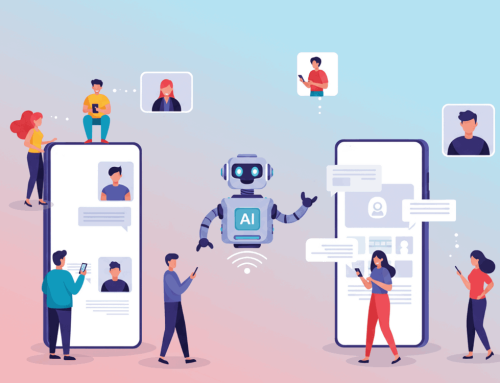Personalisation has become the cornerstone of modern marketing. Today’s customers expect brands to recognise their preferences, anticipate their needs, and deliver experiences that feel uniquely tailored. A decade ago, businesses could achieve this with manual segmentation and targeted email campaigns. But as customer bases expanded and touchpoints multiplied, offering personalisation at scale became increasingly challenging.
This is where AI chatbots in marketing have redefined the rules. By combining the speed and intelligence of artificial intelligence with the power of conversational interfaces, chatbots allow businesses to interact with thousands of customers simultaneously—without compromising the quality of those interactions. These technologies are central to personalized marketing, enabling brands to deliver relevant, real-time experiences across multiple channels and drive higher engagement and conversions.
Personalisation at scale is no longer reserved for global tech giants; with the right strategy, even small and medium-sized businesses can implement it effectively. The key lies in understanding how AI chatbots bridge the gap between automation and human-like engagement. AI chatbots can predict customer behavior by analyzing data to identify patterns and preferences, allowing for more targeted and timely interactions.
Delivering a personalized experience at scale is now achievable, providing tailored content and interactions that enhance engagement, improve customer satisfaction, and boost conversion rates.
Introduction
Personalisation at scale is now a cornerstone of successful business strategy, enabling brands to deliver tailored experiences that drive increased customer engagement, loyalty, and revenue. As customers demand more personalized interactions, companies must develop a robust Personalisation strategy that leverages customer data, marketing automation, and artificial intelligence to create highly relevant customer experiences. By understanding and responding to individual preferences and behaviors, businesses can deliver personalized interactions that resonate with their audience. In this guide, we’ll explore the foundations of Personalisation, its evolution in marketing, the key principles and approaches for success, and how to measure the impact of Personalisation at scale.
Foundations of Personalisation
Personalisation has shifted from being a competitive advantage to a business necessity. To achieve Personalisation at scale, organizations must develop a deep understanding of their customer base—who their customers are, what they value, and how they behave. This means going beyond surface-level demographics to analyze preferences, purchase history, and engagement patterns. By building a comprehensive view of their audience, businesses can create strategies that deliver meaningful, relevant experiences to every customer, every time. Achieving Personalisation at scale requires a commitment to ongoing learning and adaptation as customer needs evolve.
The Evolution of Personalisation in Marketing
The journey of Personalisation in marketing has evolved dramatically over the years. What began as simple tactics—like adding a customer’s name to an email—has transformed into sophisticated, data-driven Personalisation strategies. Today, businesses harness real-time customer data, machine learning, and marketing automation to deliver tailored experiences across multiple channels, including mobile apps, websites, and social media platforms. As customer expectations continue to rise, brands must adapt by using advanced Personalisation strategies that provide unique, relevant interactions at every touchpoint. Leveraging real time customer data and machine learning, companies can anticipate needs and deliver tailored experiences that set them apart in a crowded marketplace.
Key Principles and Approaches
To achieve Personalisation at scale, businesses should focus on several key principles and approaches:
- Leverage unified customer data: Integrate data from all touchpoints to gain deeper insights into customer behavior and preferences, enabling more accurate and relevant Personalisation efforts.
- Utilize marketing automation and artificial intelligence: Automate the delivery of personalized content and interactions, ensuring consistency and efficiency across channels.
- Prioritize customer experience and satisfaction: Focus on delivering personalized experiences that drive loyalty, retention, and long-term value.
- Continuously measure and optimize: Regularly assess the effectiveness of Personalisation efforts, using data analytics to refine strategies and improve business outcomes.
- Ensure data governance and accuracy: Maintain high standards for data quality and compliance, building trust and delivering relevant, personalized content to customers.
By following these principles, businesses can deliver relevant, personalized experiences that drive engagement and achieve Personalisation at scale.
The Role of AI Chatbots in Achieving Personalisation at Scale

AI chatbots are no longer simple FAQ tools; they have evolved into powerful engines of digital personalisation. By using natural language processing (NLP) and machine learning, and by leveraging machine learning to analyze customer data, chatbots can understand user intent, recall previous interactions, and deliver contextually relevant responses. This enables customer Personalisation at scale, allowing brands to tailor interactions to individual preferences and behaviors. As a result, chatbots have become one of the most effective tools for achieving personalisation at scale in marketing, delivering personalized digital experiences that drive engagement and satisfaction.
How Chatbots Enable Scalable Personalisation
- Data-Driven Conversations
AI chatbots analyse customer data—such as browsing behaviour, purchase history, and engagement patterns—to provide responses tailored to each user. Instead of one-size-fits-all replies, businesses can use chatbots to deliver nuanced, personalised recommendations. Chatbots also create tailored experiences for each user by leveraging real-time data and customer insights. - 24/7 Customer Engagement
Unlike human agents, chatbots do not need downtime. They allow brands to provide round-the-clock personalisation at scale, ensuring every customer feels valued, regardless of the time zone. - Seamless Integration with Marketing Platforms
Modern AI chatbots integrate with CRMs, email automation tools, and analytics dashboards. This ensures that the chatbot becomes part of a wider chatbot marketing strategy, where each interaction feeds into a holistic view of customer engagement. - Hyper-Personalised Recommendations
By using predictive analytics, AI chatbots can suggest products or services based on customer intent. For example, an e-commerce chatbot might highlight seasonal deals tailored to a customer’s browsing history, creating a personalised experience without human input. Chatbots can also deliver personalized messages and relevant content to users, enhancing engagement and satisfaction.
Why This Matters for Businesses
Personalisation is proven to increase conversion rates, customer satisfaction, and loyalty, and can significantly enhance the effectiveness of marketing campaigns. Yet, scaling personalisation across thousands of customer journeys—and achieving true scaling Personalisation— is nearly impossible manually. AI chatbots make it possible to replicate one-to-one human conversations on a massive scale, enabling brands to personalize experiences at every stage of the marketing funnel—from lead generation to retention.
Benefits of Personalisation at Scale for Marketing Success
The power of personalisation at scale extends far beyond customer engagement. It reshapes how brands interact with audiences, ensuring marketing strategies are not only targeted but also deeply impactful. When AI chatbots are deployed effectively, businesses can transform personalisation from a costly, manual process into an automated, scalable system that delivers measurable results. This approach significantly enhances marketing efforts by enabling businesses to personalize customer engagement and scale campaigns more efficiently.
Improved Customer Engagement
Customers today expect tailored interactions, which can be achieved by analyzing customer behaviors to inform engagement. By offering personalisation at scale, chatbots engage customers in ways that resonate with their preferences and past behaviours. For instance, a user browsing financial services may receive personalised guidance on investment options, while an e-commerce shopper might be presented with discounts on previously viewed items—both shaped by customers preferences. This makes the experience feel relevant, fostering stronger engagement.
Higher Conversion Rates
AI chatbots can turn conversations into conversions by enabling brands to deliver personalized content to users. By identifying where a customer is in the sales funnel and offering tailored recommendations, brands can shorten decision-making processes. In fact, personalisation at scale often leads to higher click-through rates, increased purchases, and stronger long-term retention.
Cost-Effective Marketing Strategy
Traditional personalisation requires significant resources—dedicated teams, constant data updates, and manual targeting efforts, and relying on disconnected point solutions for personalisation often leads to fragmented data and inefficient workflows. Chatbots automate much of this process, making personalisation at scale more affordable and accessible to businesses of all sizes. The reduced operational costs allow companies to allocate resources towards growth and innovation.
Enhanced Customer Loyalty
Personalisation creates emotional connections. Customers who feel understood are more likely to remain loyal to a brand, creating experiences that keep customers coming back. By ensuring consistent personalisation at scale, AI chatbots build trust through every interaction, whether it’s resolving a query, suggesting products, or sending personalised offers. Over time, this strengthens brand loyalty and increases customer lifetime value.
Data-Driven Insights
AI chatbots don’t just personalise — they learn. Every interaction generates data that can be analysed to extract key insights from consumer data, uncovering customer preferences, market trends, and behaviour patterns. These insights help refine future strategies, making personalisation at scale a continuously evolving advantage.
How to Implement Personalisation at Scale Using AI Chatbots
Understanding the value of personalisation at scale is one thing, but putting it into practice requires careful planning, the right technology, and a data-driven approach. AI chatbots act as the bridge between customer data and meaningful engagement, but businesses must follow a structured process to unlock their full potential. By leveraging a customer data platform to aggregate information from multiple sources, businesses can build comprehensive customer profiles, enabling effective Personalisation and improved segmentation.
Step 1: Define Customer Segments and Objectives
The foundation of personalisation at scale lies in knowing your audience. Businesses must first define their customer segments — based on demographics, buying behaviour, and online activity — and align chatbot objectives with marketing goals. For example:
- An e-commerce brand might focus on reducing cart abandonment.
- A SaaS business may prioritise upselling and subscription renewals.
- A hospitality service could aim for enhancing guest experiences through personalised travel recommendations.
By setting clear objectives, chatbots can be trained to deliver targeted personalisation rather than generic interactions, ensuring these objectives are aligned with the overall scale strategy.
Step 2: Integrate Chatbots with Customer Data Platforms
For chatbots to deliver personalisation at scale, they need access to rich customer data. This requires integration with:
- CRMs (Customer Relationship Management systems): To recall past purchases and preferences, and to leverage first party data for more accurate personalisation.
- Marketing Automation Tools: For sending personalised follow-ups.
- Analytics Dashboards: To track performance and refine strategies.
When integrated correctly, AI chatbots can provide seamless and consistent experiences across multiple touchpoints.
Step 3: Deploy AI-Powered Natural Language Processing
Natural language processing (NLP) is essential for chatbots to interpret intent, tone, and context. By using NLP, chatbots move beyond scripted replies, creating authentic conversations that feel human-like. This step is critical in achieving personalisation at scale, as it ensures responses are not only personalised but also contextually relevant, and can be delivered through in app messages and push notifications.
Step 4: Continuously Train and Optimise
AI chatbots learn over time. Businesses must monitor interactions, identify gaps, and retrain bots to ensure accuracy and relevance. For instance, if customers frequently ask about product availability, the chatbot can be trained to provide stock updates automatically. This process ensures personalisation at scale remains effective and adaptive, delivering tailored experiences as a result of continuous optimization.
Step 5: Combine Chatbots with Human Support
While AI chatbots are powerful, personalisation should not feel robotic. Businesses achieve the best results by using a hybrid model where chatbots handle repetitive queries, while human agents step in for complex issues. This balance ensures efficiency without sacrificing empathy, while also providing consistent messaging across all interactions.
Measuring Success in Personalisation at Scale
Measuring the success of Personalisation at scale is essential for understanding its impact on both customer experiences and business outcomes. By tracking the right metrics, organizations can identify what’s working, uncover areas for improvement, and demonstrate the value of their Personalisation strategy. Effective measurement ensures that Personalisation efforts remain aligned with business goals and continue to deliver meaningful results for both customers and the company.
Key Metrics and KPIs
To evaluate the effectiveness of Personalisation at scale, businesses should monitor a range of key metrics and KPIs, including:
- Customer engagement and satisfaction: Track metrics such as click-through rates, conversion rates, and Net Promoter Score (NPS) to gauge how well personalized experiences are resonating with customers.
- Customer retention and loyalty: Measure customer lifetime value (CLV) and average order value (AOV) to assess the long-term impact of Personalisation on customer relationships.
- Revenue and ROI: Analyze revenue growth and return on investment (ROI) to determine the financial benefits of Personalisation at scale.
- Customer experience metrics: Use customer effort score (CES) and customer satisfaction (CSAT) to evaluate the overall quality of personalized interactions.
- Data accuracy and governance: Monitor data quality and compliance with regulations to ensure that Personalisation efforts are built on a solid, trustworthy foundation.
By focusing on these metrics, businesses can gain valuable insights into the effectiveness of their Personalisation at scale initiatives, optimize their strategies, and continue to deliver exceptional customer experiences that drive business growth.
Challenges and Limitations of Personalisation at Scale

While personalisation at scale through AI chatbots offers businesses powerful opportunities, it is not without its challenges. In particular, content creation for personalized experiences can be complex and resource-intensive. Organisations must address these limitations carefully to ensure that their strategies remain effective, ethical, and compliant.
Data Privacy and Compliance Concerns
Personalisation relies heavily on data. To achieve personalisation at scale, businesses must collect and process personal information responsibly. This creates challenges in complying with regulations such as the UK GDPR. Customers are increasingly aware of how their data is used, meaning transparency and consent are essential. Mishandling this aspect can lead to reputational damage and legal penalties.
Risk of Over-Automation
Although AI chatbots make personalisation at scale possible, there is a risk of over-reliance. Customers can quickly identify when interactions feel too automated or generic. If chatbots are not properly trained, personalisation attempts may feel forced rather than authentic, undermining the user experience.
Integration Complexities
Implementing personalisation at scale requires seamless integration between AI chatbots, CRMs, analytics platforms, and marketing tools. For small and medium-sized businesses, this can be technically complex and resource-intensive. Poor integration may result in fragmented customer journeys instead of truly personalised experiences.
Cost of Implementation
While chatbots ultimately reduce long-term costs, initial setup expenses — from custom development to integration — can be significant. Businesses must balance these costs against the benefits of delivering personalisation at scale, ensuring that the investment is justified by measurable ROI.
Bias and Misinterpretation in AI
AI systems learn from historical data, which can sometimes introduce bias. For example, if the chatbot’s training data reflects skewed customer patterns, its recommendations may unintentionally exclude certain groups. This challenge highlights the importance of continuous monitoring to ensure fairness in personalisation at scale.
Human Touch Still Matters
Even with advanced chatbots, there are limits to automation. Personalisation should never entirely replace human connection. Many customers, especially in sensitive industries like healthcare or financial services, still value speaking to a real person. Without the right balance, personalisation at scale risks becoming impersonal.
Future of Personalisation at Scale with AI Chatbots
The journey of personalisation at scale is only beginning. As AI technology continues to advance, the capabilities of chatbots will expand, offering businesses even more powerful ways to connect with customers. The future will not just be about automating conversations but creating dynamic, emotionally intelligent interactions that drive long-term loyalty. AI chatbots will enable businesses to design personalized journeys, optimizing the entire customer journey by leveraging data and automation to deliver tailored experiences at every touchpoint.
AI-Powered Predictive Personalisation
Future chatbots will go beyond reactive responses. Using predictive analytics, they will anticipate customer needs before they are expressed. For example, an AI chatbot could remind a customer about renewing a subscription, offer personalised discounts, or suggest complementary products — all before the customer initiates contact. This represents a significant leap in personalisation at scale.
Emotional Intelligence and Sentiment Analysis
One limitation of current chatbots is their struggle with empathy. Future AI models will integrate sentiment analysis, enabling them to detect emotions such as frustration, excitement, or confusion. This means customers will not only receive personalised offers but also empathetic responses that adapt to their mood — an evolution in personalisation at scale.
Omnichannel Personalisation
The next wave of chatbot development will focus on seamless experiences across all digital platforms. Customers will engage with chatbots via websites, social media, mobile app as a core channel for omnichannel Personalisation, and even voice assistants, while receiving consistent personalisation at scale. This omnichannel approach ensures that no matter where customers interact, they feel recognised and valued.
Hyper-Automation with Human Collaboration
Rather than replacing human agents, the future will see AI chatbots working more collaboratively with human teams. Bots will handle data-heavy, repetitive tasks while humans intervene for complex or sensitive issues. This hybrid model ensures that personalisation at scale remains efficient without losing the human touch.
Ethical and Responsible AI in Marketing
As AI becomes more sophisticated, ethical considerations will take centre stage. Future personalisation strategies will prioritise transparency, fairness, and customer consent. Businesses that embrace responsible AI practices will not only comply with regulations but also build trust by showing that personalisation at scale respects user rights.
Frequently Asked Questions (FAQs)
1. What does personalisation at scale mean?
Personalisation at scale refers to the ability of businesses to deliver tailored experiences to a large number of customers simultaneously. Instead of treating customers as one-size-fits-all, brands use AI chatbots and data-driven strategies to provide individualised recommendations, offers, and support across thousands of interactions.
2. How do AI chatbots deliver personalisation at scale?
AI chatbots use customer data, natural language processing (NLP), and machine learning to interpret behaviour and intent. They analyse browsing history, purchase records, and engagement patterns to provide relevant responses, creating authentic and scalable personalisation in real time.
3. Why is personalisation at scale important for marketing?
Consumers expect brands to understand their needs. Personalisation at scale ensures that every interaction is relevant, boosting customer satisfaction, loyalty, and conversion rates. It also gives businesses a competitive advantage by turning data into actionable insights.
4. Can small businesses use AI chatbots for personalisation at scale?
Yes. While enterprise companies have led adoption, AI chatbot solutions are now affordable and accessible to small and medium-sized businesses. By integrating with CRMs and marketing tools, even smaller organisations can achieve personalisation at scale without excessive costs.
5. What industries benefit most from personalisation at scale?
Every industry can benefit, but some key examples include:
- E-commerce: Personalised product recommendations.
- Hospitality: Tailored travel suggestions and booking support.
- Finance: Customised investment or banking advice.
- Healthcare: Personalised wellness and appointment reminders.
AI chatbots help each sector deliver personalisation at scale while saving time and resources.
6. What are the risks of personalisation at scale?
Challenges include data privacy concerns, integration complexities, and the risk of over-automation. Businesses must balance technology with a human touch to ensure that personalisation at scale remains authentic and compliant with regulations.
Unlocking the Power of Personalisation at Scale
The demand for meaningful customer interactions has never been higher, and businesses that fail to adapt risk being left behind. With AI chatbots, personalisation at scale is no longer a distant ambition but a practical, achievable reality. From improving engagement and conversions to strengthening loyalty and delivering cost-effective marketing, the benefits are clear.
Yet, businesses must also be mindful of the challenges — ensuring data compliance, balancing automation with the human touch, and investing in robust integration. The future will only amplify these opportunities, with predictive analytics, sentiment-aware chatbots, and omnichannel consistency driving the next generation of marketing.
For organisations ready to innovate, adopting AI chatbots is not just about keeping up with digital transformation; it’s about leading with personalised experiences that resonate with every customer, at every stage of their journey. By embracing personalisation at scale, brands can unlock new levels of growth, trust, and customer satisfaction.
Final Thoughts
At Smart Digitants, we help businesses harness the true power of personalisation at scale. Our AI-driven chatbot solutions are designed to deliver customised customer journeys that increase engagement, boost conversions, and build long-lasting loyalty.
Whether you are an e-commerce brand looking to reduce cart abandonment, a service provider aiming to enhance client communication, or a growing business seeking smarter marketing solutions — we have the expertise to help.
Contact Smart Digitants today to discover how our AI chatbot strategies can transform your customer experience through scalable, intelligent personalisation.
Our Content Writing Team at Smart Digitants is a group of dedicated professionals, passionate about creating high-quality, engaging content.
- The Role of AI Chatbots in Achieving Personalisation at Scale
- Benefits of Personalisation at Scale for Marketing Success
- How to Implement Personalisation at Scale Using AI Chatbots
- Challenges and Limitations of Personalisation at Scale
- Future of Personalisation at Scale with AI Chatbots
- Frequently Asked Questions (FAQs)
- 1. What does personalisation at scale mean?
- 2. How do AI chatbots deliver personalisation at scale?
- 3. Why is personalisation at scale important for marketing?
- 4. Can small businesses use AI chatbots for personalisation at scale?
- 5. What industries benefit most from personalisation at scale?
- 6. What are the risks of personalisation at scale?
- Unlocking the Power of Personalisation at Scale
- Final Thoughts









